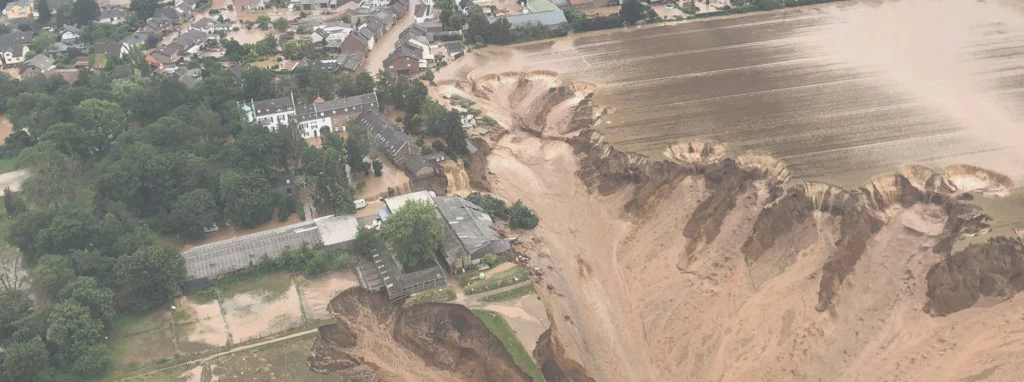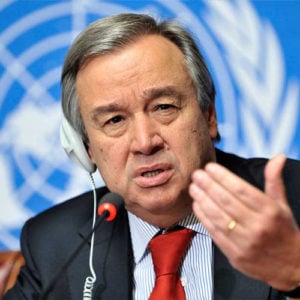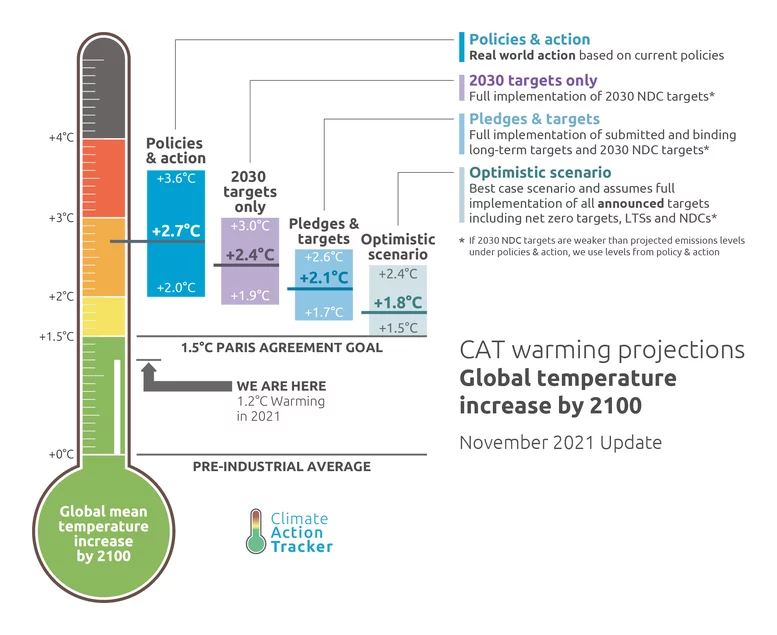
What is the climate catastrophe?
Climate catastrophe is the term for one Climate change with worldwide catastrophic Effects. This also includes an uncontrolled one global warming, like Greenhouse soil-Scenario.
Greenhouse gases, such as CO2 and methane, are gases that are present in small quantities in the atmosphere and contribute to the planet's greenhouse effect.
The greenhouse gases absorb radiation that would normally have escaped into space, thereby heating the planet. They function like a kind of greenhouse.
For the last millennia, greenhouse gas concentrations and thus the temperature on Earth have been relatively constant. This phase provided the perfect climatic niche for human life and enabled us to develop civilization as we know it today.
Then came the Industrial Revolution and with it greenhouse gas emissions at a rate that was hardly comparable. The use of fossil fuels such as coal, oil and gas are the main drivers for this. As a result of these man-made changes in the climate, the balance of the last millennia is getting out of control and we are experiencing the earth heating up at an unprecedented rate and with a number of catastrophic consequences for people and nature.
UBA – Explanatory film on the greenhouse effect
What does that currently mean?
Current examples of the consequences of the climate catastrophe:
We know that human-caused global warming will cause flood disasters to become more frequent and severe. Last year, 180 people died in western Germany (Ahr Valley) and thousands lost their homes.
This year in August, floods in Pakistan left over 1500 people dead, including 528 children, and 33 million people had to flee their homes. Entire areas of the country were cut off and people went hungry.
We know that hunger catastrophes will become more severe and more frequent. Due to the impacts of the climate emergency, East Africa is already suffering from extreme droughts and floods. Last year, at least 250.000 children starved to death there before the age of five.
What does this mean for our future?
The latest scientific results say this:
The Earth is currently 1,2°C hotter than it was in 1900.
We will reach 1,5°C in 2030. Germany has set itself the goal of becoming climate neutral by 2045 in order to comply with the Paris Agreement.
Tipping points – “Either Or”
Now let's get to the really bad news.
What is unique about the climate crisis?
Absolute humanitarian catastrophes such as war, mass destruction and disease have always existed in human history. Diseases killed millions in a very short time, and wars wiped out entire generations. Now these events have passed, humanity has been able to recover, learn from its mistakes and continue to exist.
And that is exactly not the case in the climate crisis. With every year that we let pass, the climate crisis is getting worse. If we exceed the critical limit, we will have completely changed, hostile conditions for humanity for the next thousands of years.
Why? Because of the tipping points. Self-reinforcing elements in the climate system, which, when the critical threshold is exceeded, continue to heat the earth without our intervention.
The Arctic is melting and will soon be ice-free in the summer, the Greenland ice sheet is tipping, the Amazon rainforest is tipping, emitting more CO2 than it absorbs. Methane has up to 80 times more of a global warming effect than CO2. Meanwhile, more and more methane is accumulating in the atmosphere, even without our intervention!
We still have a very small window of opportunity to catch the ball. If we don't get to the right point now, it will be too late and the ball will be gone. Unreachable! It really is an “either/or” of biblical proportions. Either we can do it now – or never.
For the first time in human history we are at such a point. There has never been a situation like this before! Either do everything now to give us a chance to continue to exist as humanity, or be surely destroyed.
And it doesn’t matter whether we take small steps in the right direction or “half” reach the ball.
Current forecasts predict a 30% decline in global crop yields by 2050, while food demand is expected to increase by 50%.
At 3°C global warming, devastating crop failures occur due to droughts, desertification, floods, insect deaths and other climate impacts. This would affect 20% of global harvests.
At 3°C, the livelihoods of 3 billion people are acutely threatened. This means that these people have to fear for their lives because of the lack of water, the crop failures, the extreme heat, the fires and floods. They simply can't survive there anymore.
Over 1.5 degrees
The current political course has us exceeding 1.5 °C in 2030, if all political measures are adhered to worldwide, we will end up at around 3,2 °C.
Paris goals can only be achieved if we use emissions technologies that we don't yet have.
The tipping point for the world's coral reefs has probably already been passed; the Great Barrier Reef is bleaching and will be dead in about 10 years.
The West Antarctic and Greenland ice sheets have probably already reached their tipping points.
Parts of East Antarctica could be similarly unstable.
Arctic sea ice has already shrunk by 75% this summer. The Arctic will probably soon be completely ice-free in summer.
We are expected to reach 2°C warming before 2050.
The tipping points that will come our way next are expected to be between 1,5°C and 2°C. We don't know if you can safely stop the system between 1,5°C and 2°C. It may already be too unstable there to be stopped.
Even the world climate report that 195 countries have signed says:
- that by the end of the century, with global warming of two degrees Celsius, 18 percent of all land organisms are threatened with extinction. At four degrees Celsius, every second species will be threatened with extinction, triggering an irreversible mass extinction and thus destroying entire ecosystems.
- Greenhouse gases must be radically reduced in order to change anything - political actions are not fast enough and not decisive
- With global warming of two degrees, around 800 million to three billion people on earth will suffer from chronic water shortages. Vi
- Spread of climate-related diseases – regular heat deaths
Quotes from recognized scientists from climate impact research

Sir David King, for many years the British government's chief scientific advisor on climate.
“We have to act quickly. What we do in the next three to four years will, in my opinion, determine the future of humanity.”
2021 | Which
“There is a lot of discussion about how much carbon budget is left to burn and there is none, we have already burned far too much and need to go into reverse.”
“I’m telling you that we are putting our children on a global school bus that has a 98% chance of being fatal.”
“Yes, various states suddenly brought the 1,5 degrees into play. That irritated me at first, because unfortunately we can’t do that anymore – no matter how useful it would be.”
He describes the Paris climate conference as a “dream concert” and when it comes to the CO₂ budget he says: “We practically no longer have any CO₂ leeway.”

Prof. Hans Joachim Schellnhuber, climate researcher with a focus on climate impact research & founding director of PIK.

Prof. Dr. Dirk Messner, President of the Federal Environment Agency.
“3-4 degrees, societies won’t be able to withstand that, we won’t be able to adapt to this situation, we will see societies crumbling.”
“The facts are undeniable. This abandonment of leadership is criminal.”
“We have a choice. Collective action or collective suicide.”


